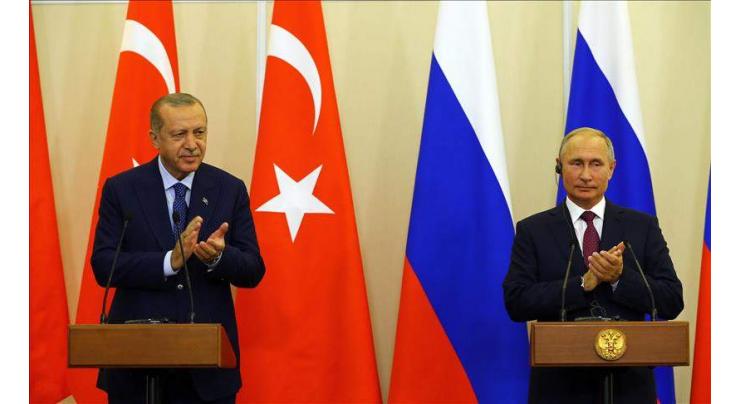
- Home
- World
- News
- Russia-Turkey Idlib Deal Leaves Damascus Free to Respond to Provocations - Syrian Lawmaker
Russia-Turkey Idlib Deal Leaves Damascus Free To Respond To Provocations - Syrian Lawmaker
Mohammad Ali (@ChaudhryMAli88) Published March 06, 2020 | 10:30 PM

The Russian-Turkish agreement on a ceasefire in Syria's Idlib is important for Damascus, since it leaves the territories that have been retaken from terrorists in the hands of the Syrian government and gives it the right to respond to any future provocations, Ashwak Abbas, member of the Syrian parliament and of the small body of the Syrian Constitutional Committee from the government side, told Sputnik
GENOA (UrduPoint News / Sputnik - 06th March, 2020) The Russian-Turkish agreement on a ceasefire in Syria's Idlib is important for Damascus, since it leaves the territories that have been retaken from terrorists in the hands of the Syrian government and gives it the right to respond to any future provocations, Ashwak Abbas, member of the Syrian parliament and of the small body of the Syrian Constitutional Committee from the government side, told Sputnik.
On Thursday, Russian President Vladimir Putin and his Turkish counterpart, Recep Tayyip Erdogan, agreed on a ceasefire in Idlib, which started at midnight. The sides also agreed to create a security corridor six kilometers (3.7 miles) north and south of the M4 highway in Syria, which connects the provinces of Latakia and Aleppo.
"It was important that Russia's position was decisive yesterday, especially with regard to the agreement that was reached that the territories which had been liberated by the Syrian Arab Army (SAA) remained in the hands of the SAA. Moreover, Turkey committed to all the agreements that took place earlier, guaranteeing international flight corridors and leaving secure areas for that, and this is a very important point. The SAA has the full right to respond to any new provocation from the armed groups in order not to allow armed groups to turn Idlib into a staging ground for attacks on the SAA or even on Russian forces in Syria," Abbas said.
She added that Erdogan is using Turkish influence on the armed groups in Syria as a "playing card" in his political maneuvers with Russia or the Syrian government.
"Recently, the number of attacks on the routes leading to, for example, the Hmeimim base, has increased because of Turkey's lack of commitment to the observation posts," Abbas said.
Earlier this week, Russian Defense Ministry spokesman Maj. Gen. Igor Konashenkov said that after 18 months since the Sochi agreements with Turkey on Syria were reached, shelling of peaceful settlements and the Hmeimim air base by terrorists had become daily. He noted that Hayat Tahrir Al-Sham and Horas al-Din (all banned in Russia) terrorists had crowded out all militants of the "moderate opposition" in the north of Syria and that the fortified areas of terrorists had merged with the Turkish observation posts deployed under the Sochi agreement. The general called Ankara's obligations to separate and oust terrorists from the external borders of the de-escalation zone to a depth of 15-20 kilometers and to withdraw heavy artillery weapons there as the key agreement of the deal.
In September 2018, Russian President Vladimir Putin and his Turkish counterpart Recep Tayyip Erdogan held talks in Sochi devoted specifically to the Idlib de-escalation zone. They agreed to create a demilitarized buffer zone in the province, which meant that all heavy weaponry operated by rebel groups was to be pulled back, and radical militants including members of the Hayat Tahrir al-Sham terrorist group, previously known as the Nusra Front (banned in Russia) were to leave the zone.
The agreement reached by Putin and Erdogan on Thursday was signed as an Additional Protocol to the Sochi agreement of September 2018.
Related Topics
Recent Stories

New Zealand’s weak team upset Pakistan's victory streak at home

US State Dept Arabic spokesperson Hala Rharrit resigns over Gaza policy

Punjab govt decides to provide free internet to schools across province

Interior Minister assures protection of Chinse nationals in Pakistan

Govt's wheat procurement target increased upto 1.8 metric tons

SC forms six-member bench to IHC judges'letters

PM to take part in World Economic Forum meeting in Riyadh today

Punjab Police officer Riffat Bukhari wins global award

Punjab Police Hero ASP Shehbano Naqvi’s wedding festivities spark joy

TECNO CAMON 30 Series set to launch at a grand fashion show in Karachi

Record growth being witnessed in IT exports due to SIFC’s efforts

Pakistan, Canada agree to enhance cooperation in all fields
More Stories From World
-
Spanish PM's supporters turn out and beg him to stay
1 minute ago -
Duplantis sails to victory in Suzhou, Simbine beats Coleman
2 minutes ago -
Hamas says studying new Israeli truce proposal
2 minutes ago -
Italy summons Russian envoy over Ariston subsidiary takeover
2 minutes ago -
Tsitsipas ousted by qualifier, Swiatek coasts into last 16
52 minutes ago -

US State Dept Arabic spokesperson Hala Rharrit resigns over Gaza policy
57 minutes ago
-
Hurricanes suffer first defeat, lead Super Rugby by one point
1 hour ago -
Tennis: ATP/WTA Madrid Open results -- 1st update
1 hour ago -
Pakistan Embassy in Beijing hosts Pakistan Professional and Student Forum
2 hours ago -
Tennis: ATP/WTA Madrid Open results
2 hours ago -
Russia hits Ukrainian energy sites in 'massive' overnight attack
2 hours ago -
Estanguet emotional as Olympic torch sets sail for France
3 hours ago
